AWM41 1027 - [Nurses Narratives] Sister Ella M Redman
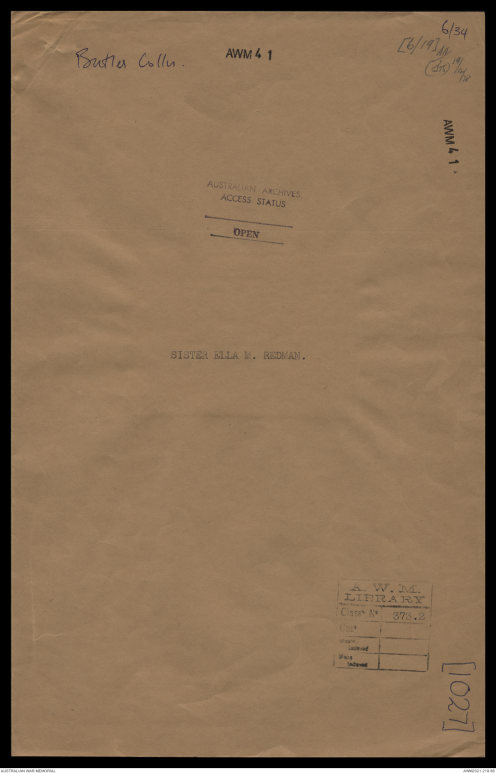
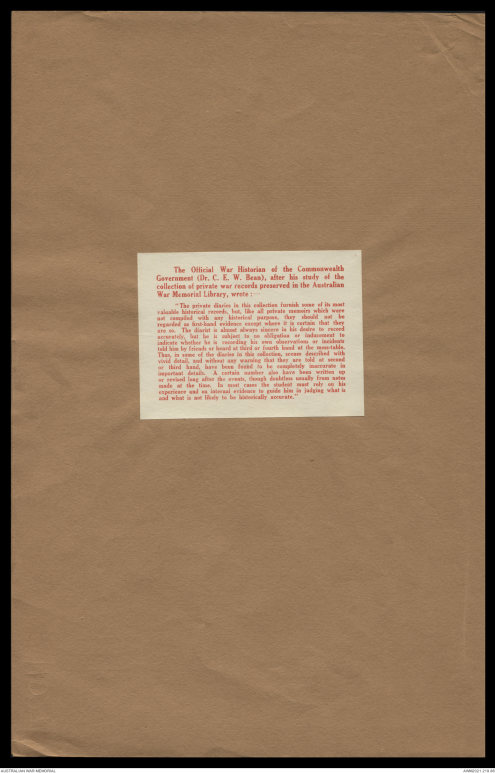
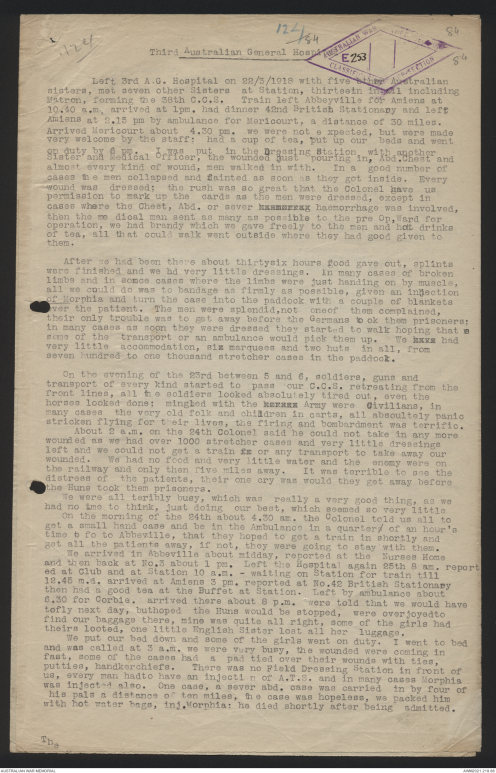
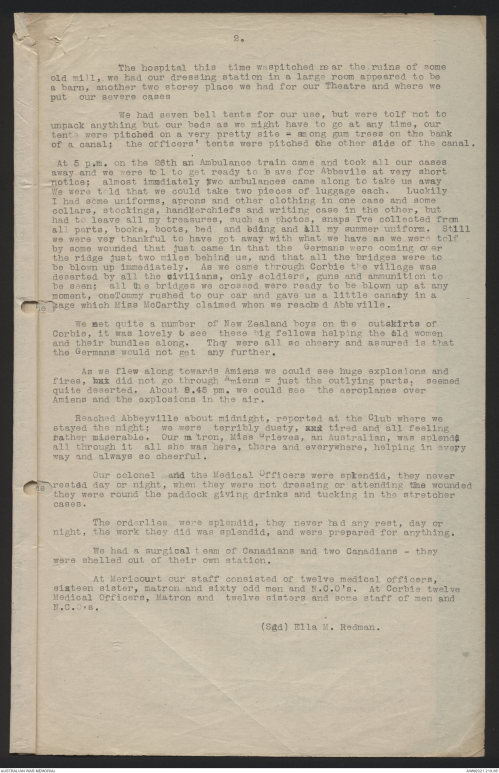
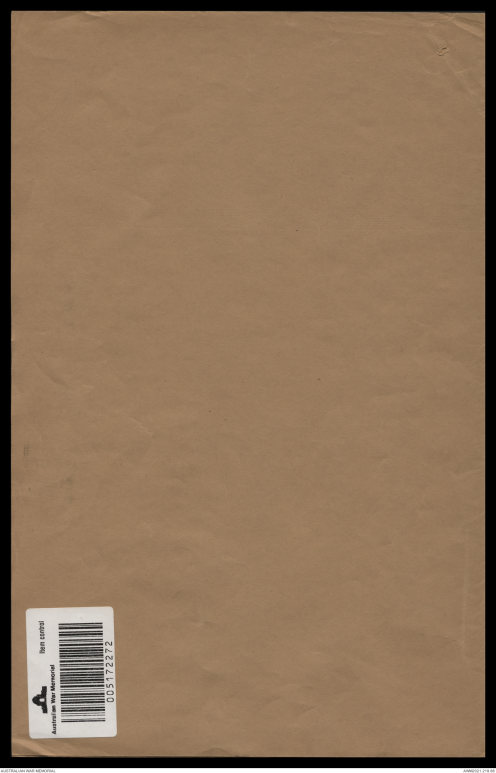
6/34
[6/19] AA
[[?(SR)?]]
19/12/[[?18?]]
AWM 4 1
Butler Colln
AUSTRALIAN ARCHIVES
ACCESS STATUS
________________
OPEN
________________
SISTER ELLA M. REDMAN.
|
A.W.M. LIBRARY |
|
|
CASE No |
373.2 |
|
[[?]] |
|
|
[[?]] |
|
|
[[?]] |
|
[1027]
The Official War Histories of the Commonwealth
Government (Dr. C. E. W. Bean), after his study of the
collections of private war records preserved in the Australian
War Memorial Library, wrote:-
The private diaries in this collection furnish some of its most
valuable historical records, but, like all private souvenirs which were
not compiled with any historical purpose they should not be
regarded as first-hand evidence except where it is certain that they
are so. The diarist is almost always sincere in his desire to record
accurately, but for a subject to no obligation or or inforcement to
indicate whether he is recording his own observations or incidents
told him by friends, or heard as third or fourth hand at the mess-table.
Thus, in some of the diaries in this collection, events described with
vivid detail, and without any warning that they are told as second
or third hand, have been found to be completely inaccurate in
important details. A certain number also have been written up
or recorded long after the events, though doubtless usually from notes
made at the time. In most cases the student must rely on his
experiences and an internal evidence to guide him in judging what is
and what is not likely to be historically accurate."
124
124/84 84
AUSTRALIAN WAR MEMORIAL Stamp
E253 84
Third Australian General Hospital
Left 3rd A. G. Hospital on 22/3/1918 with five other Australian
Sisters, met seven other Sisters at Station, thirteen in all including
Matron, forming the 38th C.C.S. Train left Abbeyville for Amiens at
10.40 a.m. arrived at 1 p.m. had dinner 42nd British Stationary and left
Amiens at 2.15 pm by ambulance for Mericourt, a distance of 30 miles.
Arrived at Mericourt about 4.30 pm. We were not e xpected, but were made
very welcome by staff; had a cup of tea, put up our beds and went
on duty by 6 pm. I was put in the Dressing Station with another
Sister and Medical Officer, the wounded just pouring in, Abd.Chest and
almost every other kind of wound, men walked in with. In a good number of
cases the men collapsed and fainted as soon as they got inside. Every
wound was dressed; the rush was so great that the Colonel gave us
permission to mark up the cards as the men were dressed, except in
cases where the Chest, Abd. Or sever xxxxxxxx haemorrhage was involved.
then the me dical men went as many as possible to the pre Op.Ward for
operation, we had brandy which we gave freely to the men and hot drinks
of tea, all that could walk went outside where they had good given to
them.
After we had been there about thirtysix hours food gave out, splints
were finished and we hd very little dressings. In many cases of broken
limbs and in some cases where the limbs were just handing on by muscles
all we could do was to bandage as firmly as possible, given an injection
of Morphia and turn the case into the paddock with a couple of blankets
over the patient. The men were splendid,not one of them complained,
their only trouble was to get away before the Germans to ok them prisoners;
in many cases as soon as they were dressed they started to walk hoping that x
Some of the transport or an ambulance would pick them up. We xxx had
very little accommodation, six marquess and two huts in all, from
seven hundred to one thousand stretcher cases in the paddock.
On the evening of the 23rd between 5 and 6, soldiers, guns and
transport of every kind started to pass our C.C.S. retreating from the
front lines, all th e soldiers looked absolutely tired out, even the
horses looked done; mingled with the xxxxxx Army were Civilians, in
many cases the very old folk and children in carts, all absolutely panic
stricken flying for their lives, the firing and bombardment was terrific.
About 2 a.m. on the 24th Colonel said he could not take in any more
wounded as we had over 1000 stretcher cases and very little dressings
left and we could not get a train xx or any transport to take away our
wounded. We had no food and very little water and the enemy distress of the patients, their one cry was would they get away before
the Huns took them prisoners.
We were all terribly busy, which was really a very good thing, as we
had no tme to think, just doing our best , which seem so very little
On the morning of the 24th about 4.30 am. The Colonel told us all to
get a small hand case and be in the Ambulance in a quarter / of an hour’s
time [[?]] to Abbeyville, that they hoped to get a train in shortly and
get all the patients away, if not, they were going to stay with them.
We arrived in Abbeyville about midday, reported to the Nurses Home
and then back to No. 3 about 1 pm. Left the Hospital again 25th 8 am report-
ed at Club and at Station 10 a.m. – waiting on Station for train till
12.45 m.a. arrived at Amiens 3 pm. reported at No. 42nd British Stationary
then had a good tea at the Buffet at Station. Left by ambulance about
6.30 for Corbis. arrived there about 8 p.m. were told that we would have
tofly next day, buthoped the Huns would be stopped, were overjoyedto
find our baggage there, mine was quite all right, some of the girls had
theirs looted, one little English Sister lost all her luggage.
We put our bed down and some of the girls went on duty. I went to bed
and was called at 3 a.m. we were very busy, the wounded were coming in
fast, some f the cases had a pad tied over their wounds with ties,
putties, handkerchiefs. There was no Field Dressing Station in front of
us, every man hadto have an injecti n of A.T.S. and in many cases Morphia
was injected also. One case, a sever abd. case was carried in by four of
his pals a distance of ten miles. The case was hopeless, we packed him
with hot water bags, inj.Morphia ; he died shortly after being admitted.
2.
The hospital this time waspitched ne ar the ruins of some
old mill, we had our dressing station in a large room appeared to be
a barn, another two storey place we had for our Theatre and where we
put our severe cases.
We had seven bell tents for our use, but were tolf not to
unpack anything but our beds as we might have to go at any time, our
tents were pitched on a very pretty site – among gum trees on the bank
of a canal; the officers’ tents were pitched the other side of the canal.
At 5 p.m. on the 28th an Ambulance train came and took all our cases
away and we were to l to get ready to le ave for Abbeyvile at very short
notice; almost immediately two ambulances came along to take us away
We were told that we could take two pieces of luggage each. Luckily
I had some uniforms, aprons and other clothing in one case and some
collars, stockings, handkerchiefs and writing case in the other, but
had to leave all my treasures, such as photos, snaps I’ve collected
all parts, books, boots, bed and bedding and all my summer uniform. Still
we were very thankful to have got away with what we have as we were tolf
by some wounded that just came in that the Germans were coming over
the ridge just two miles behind us, and that all the bridges were to
be blown up immediately. As we came through Corbis, the village was
deserted by all the civilians, only soldiers, guns and ammunition to
be seen; all the bridges we crossed were ready to be blown up at any
moment, oneTommy rushed to our car and gave us a little canary in a
cage which Miss McCarthy claimed when we reache d Abbeyville.
We met quite a number of New Zealand boys on the outskirts of
Corbis, it was lovely to see these big fellows helping the old women
and their bundles along. They were all so cheery and assured is that
the Germans would not get any further.
As we flew along towards Amiens we could see huge explosions and
fires, xxxx did not go through Amiens = just the outlying parts, seemed
quite deserted. About 8.45 pm. we could see the aeroplanes over
Amiens and the explosions in the air.
Reached Abbeyville about midnight, reported at the Club where we
stayed the night; we were terribly dusty, xxx tired and all feeling
rather miserable. Our m tron, Miss Grieves, an Australian, was splendid
all through it all she was here, there and everywhere, helping in every
way and always so cheerful.
Our colonel and the Medical Officers were splendid, they never
rested day or night, when they were not dressing or attending the wounded
they were round the paddock giving drinks and tucking in the stretcher
cases.
The orderlies were splendid, they never had any rest, day or
night, the work they did was splendid, and were prepared for anything.
We had a surgical t eam of Canadians and two Canadians – they
were shelled out of their own station.
At Mericourt our staff consisted of twelve medical officers,
sixteen sisters, matron and sixty odd men and N.C.O’s. At Corbis twelve
Medical Officers, Matron and twelve sisters and some staff of men and
N.C.O’S.
(Sgd)Ella M. Redman.
Item control
Australian War Memorial
(barcode) 005172272
 Sam scott
Sam scottThis transcription item is now locked to you for editing. To release the lock either Save your changes or Cancel.
This lock will be automatically released after 60 minutes of inactivity.